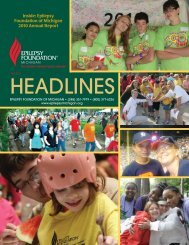Legal Rights of Children with Epilepsy in School & Child Care
Legal Rights of Children with Epilepsy in School & Child Care
Legal Rights of Children with Epilepsy in School & Child Care
Create successful ePaper yourself
Turn your PDF publications into a flip-book with our unique Google optimized e-Paper software.
What Laws Apply to <strong><strong>Child</strong>ren</strong> <strong>with</strong> <strong>Epilepsy</strong>?<br />
2.7Q:<br />
Does the IDEA impose requirements for the evaluation process?<br />
A: Yes. The school district or public agency 8 must use a variety <strong>of</strong> assessment tools<br />
and strategies, <strong>in</strong>clud<strong>in</strong>g <strong>in</strong>formation provided by the parent, to gather<br />
functional, developmental and academic <strong>in</strong>formation about the student. The<br />
district may not use any one assessment or s<strong>in</strong>gle measure as the only criterion<br />
for determ<strong>in</strong><strong>in</strong>g whether a student has a disability or determ<strong>in</strong><strong>in</strong>g an appropriate<br />
educational program for him or her. The district must use technically sound<br />
assessment <strong>in</strong>struments that may assess the relative contributions <strong>of</strong> cognitive<br />
and behavioral factors <strong>in</strong> addition to physical or developmental factors. Also, the<br />
district must ensure that the assessment materials are not selected or<br />
adm<strong>in</strong>istered <strong>in</strong> a racially or culturally discrim<strong>in</strong>atory manner, are provided and<br />
adm<strong>in</strong>istered <strong>in</strong> the student’s native language or other mode <strong>of</strong> communication,<br />
and that they are <strong>in</strong> a form most likely to yield accurate <strong>in</strong>formation about what<br />
the child can do academically, functionally and developmentally, unless it is<br />
clearly not feasible to provide or adm<strong>in</strong>ister the assessment <strong>in</strong> such a manner.<br />
The assessments must be used for the purposes for which they are valid and<br />
reliable, must be adm<strong>in</strong>istered by tra<strong>in</strong>ed and qualified personnel, and must be<br />
adm<strong>in</strong>istered <strong>in</strong> accord <strong>with</strong> <strong>in</strong>structions provided by the producer <strong>of</strong> the<br />
assessment.<br />
Assessments must <strong>in</strong>clude those tailored to assess specific areas <strong>of</strong> educational<br />
need, and may not be selected so as to assess only a s<strong>in</strong>gle general <strong>in</strong>telligence<br />
quotient (IQ score). Assessments must also be selected and given <strong>in</strong> a way that<br />
takes <strong>in</strong>to account a student’s disability and accurately tests the student’s<br />
aptitude or whatever the test is measur<strong>in</strong>g, rather than the student’s impaired<br />
skill, unless that is the purpose <strong>of</strong> the test. The student must be assessed <strong>in</strong> all<br />
areas <strong>of</strong> disability. 20 U.S.C. 1414(b); 34 C.F.R. 300.304. For a student<br />
suspected <strong>of</strong> hav<strong>in</strong>g a learn<strong>in</strong>g disability, the district may use a process that<br />
determ<strong>in</strong>es if the student responds to scientific, research-based <strong>in</strong>struction.<br />
Additionally, <strong>in</strong> order to determ<strong>in</strong>e that a student is eligible for special education<br />
as a student <strong>with</strong> a learn<strong>in</strong>g disability, the team must document the results <strong>of</strong> an<br />
observation <strong>of</strong> the student. 34 C.F.R. 300.311. 9 See Chapter 4 for a more<br />
specific discussion <strong>of</strong> the evaluation process for students <strong>with</strong> epilepsy.<br />
8 This manual will use the term “school district,” rather than “public agency,” the term used by the IDEA,<br />
because the majority <strong>of</strong> students <strong>with</strong> epilepsy attend schools operated by local or <strong>in</strong>termediate school<br />
systems. It is important to note, however, that the IDEA’s requirements extend to educational programs<br />
operated by public agencies such as departments <strong>of</strong> juvenile services, departments <strong>of</strong> mental health, and<br />
schools for the bl<strong>in</strong>d and deaf, as well as departments <strong>of</strong> correction.<br />
9 There are a number <strong>of</strong> requirements regard<strong>in</strong>g identification <strong>of</strong> a student as hav<strong>in</strong>g a learn<strong>in</strong>g disability.<br />
See 34 C.F.R. 300.307-311.<br />
16








